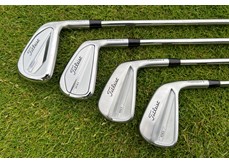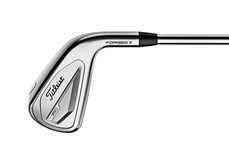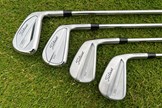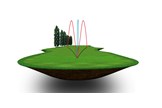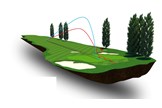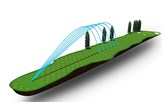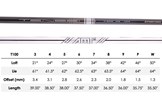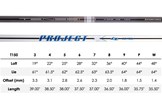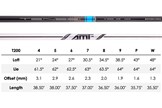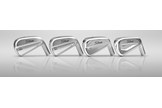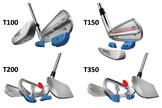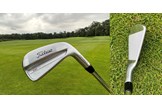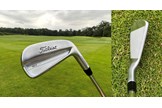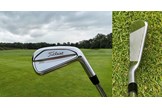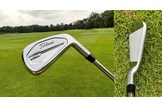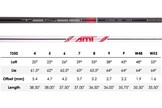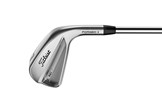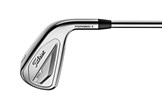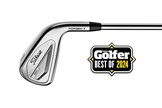Titleist T100, T150, T200 & T350 Irons (2023) Review
Last updated:
-
At a glance
- TG Rating
- Owner Rating
-
Pros
- All four irons are very good looking in the play position.
- Hit all four heads during a fitting to see how ball flight changes, which will help you decide which best maximises your scoring potential.
- There's an iron within the family for pretty much every golfer on the planet.
-
Cons
- You may need to give up a little ball speed or carry distance to reap the benefits of better distance control, dispersion and a steeper descent angle.
What we say...
The new T100, T150, T200 and T350 Titleist T-Series irons promise to help golfers shoot lower scores through upping shot consistency and score-ability.
Go for a fitting on the new Titleist T-Series irons and you’ll experience a very different way to how the brand dials you into your perfect new setup. Having come through a decade where iron lofts have got stronger, and launch monitors have led golfers to focusing on ball speed and distance, Titleist have come up with a new “3D fitting philosophy”. They say the idea helps golfers more easily identify the best golf irons for their game and will lead to more consistent scoring.
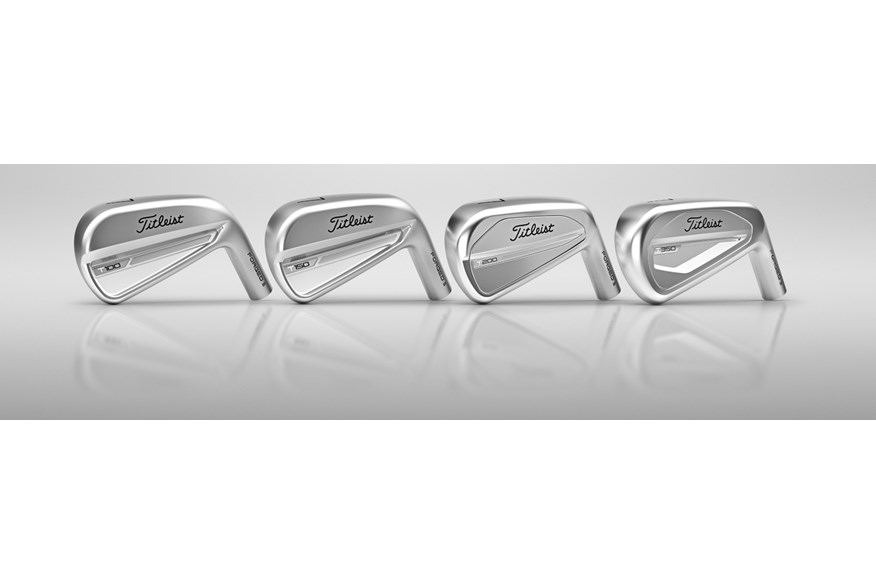
Titleist’s 3D thinking comes down to three Ds: Distance Control, Dispersion Control, and Descent Angle. The combination is designed to help golfers hit shots into a smaller, more predictable area, more consistently – which is the target for virtually every player on the planet.
Don’t be too upset if the new fitting philosophy means giving up some ball speed or carry distance (we did) to find your optimally fitted iron; with shots flighted correctly you will score better. Here’s how they do it.
How does better distance control help you score better?
Golf commentators on TV regularly highlight how important it is for pros to control distance consistency; it’s just not possible to score well if they don’t. Titleist’s new T-Series fitting philosophy maximizes carry distance while maintaining even and consistent 5mph ball speed gaps between clubs. That may well mean using a blended set of irons, an approach adopted by 80% of players on the PGA Tour. Or it could lead to integrating a utility iron/hybrid into your set to achieve ideal gapping.
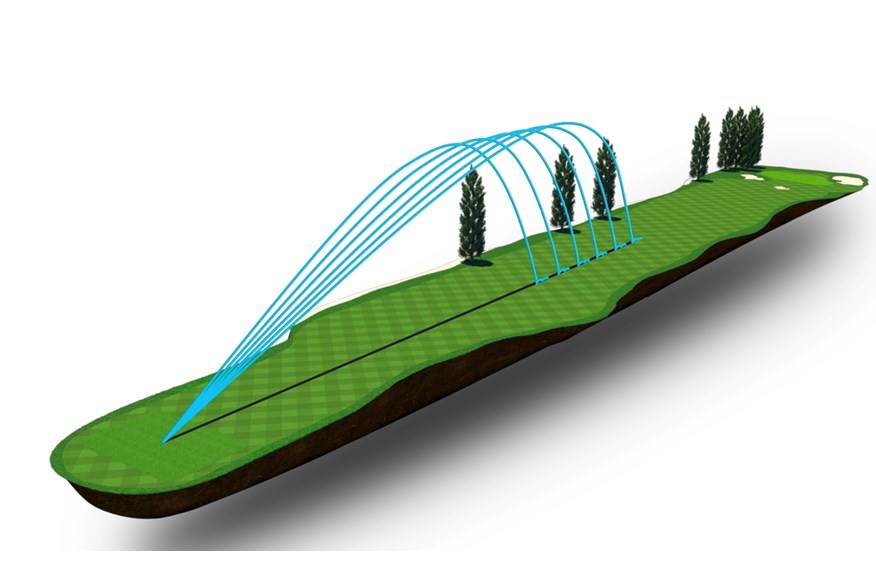
But, rather than just chasing the longest or fastest shots to sell you a set of irons, Titleist’s approach is tightening the gap between on and off-centre hits. So, good and poor strikes will hit the green, which long term will give golfers more opportunities to shave shots from their game.
How does better dispersion control help you score better?
Across the four new sets of Titleist T-Series irons, there’s an average of 100g of tungsten weight inside (which is a lot compared to some models on the market), which ups MOI and forgiveness. By controlling how much the head deflects at impact, thanks to cramming each head full of tungsten, shots that don’t hit the center face don’t fly as far offline and don’t lose as much ball speed, which legitimately ups scoring consistency.
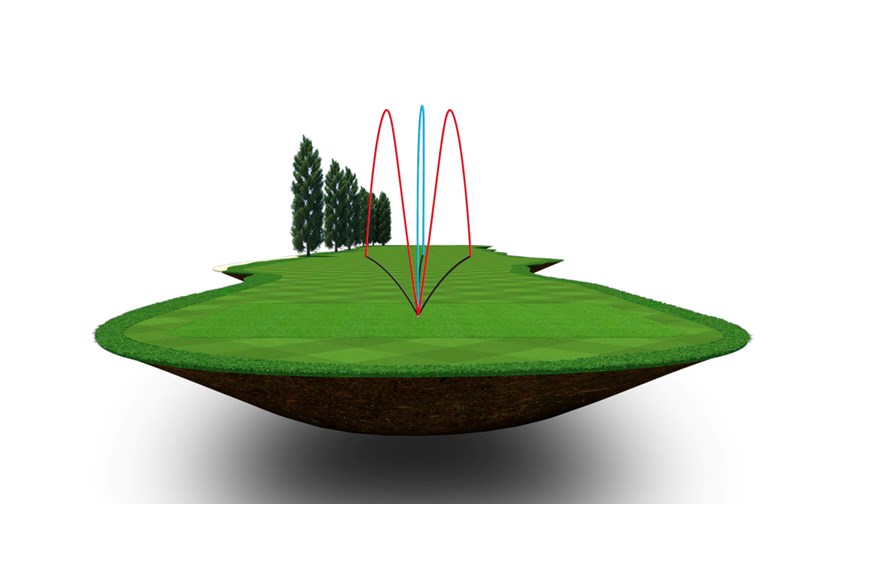
Titleist promise their fitters will only dial golfers into models which don’t sacrifice left-to-right dispersion for improved ball speed and distance. Interestingly, the brand also say the T-Series irons are the most forgiving golf irons on the market, relative to blade length. Where with other more forgiving models you will need to accept a larger size; to illustrate their point the Ping G430 iron which is more forgiving than the new T350 also has a longer blade length.
How does descent angle help you score better?
We’ve been saying it for years: if you’re looking at strong lofted irons, you have to generate enough speed, backspin, shot height, and a steep enough descent angle to get shots to stop on a green. If you don’t, any distance gains are absolutely worthless. It’s refreshing then to hear a brand say speed and distance is no longer their primary concern for fitting golfers.
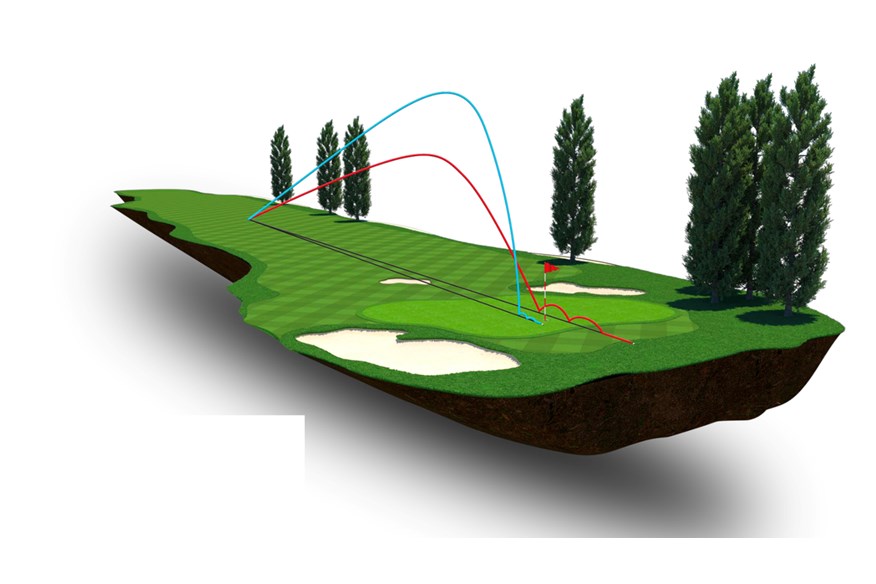
Obviously exact speed, spin and descent angle numbers are player dependent. But, from our experience, a 7-iron generating sub 5000 RPM levels of backspin, or a shallower descent angle than 45°, should at the very least set alarms bell ringing. Without sufficient levels of spin and descent angle shots just won’t stop on hitting the dancefloor.
Everything you need to know about the Titleist T100 2023 iron
The T100 is THE modern tour iron. Forged with a small cavity back, the model is rammed full of tungsten toe and heel weighting inside the back bar, which makes this super compact model pretty forgiving for its size. Expect the enhanced back bar profile to improve feel, stability, and sound.
A subtle shift in CG position is combined with a new CNC Milled face to give greater ball flight consistency, especially useful when moving from fairway to first cut.
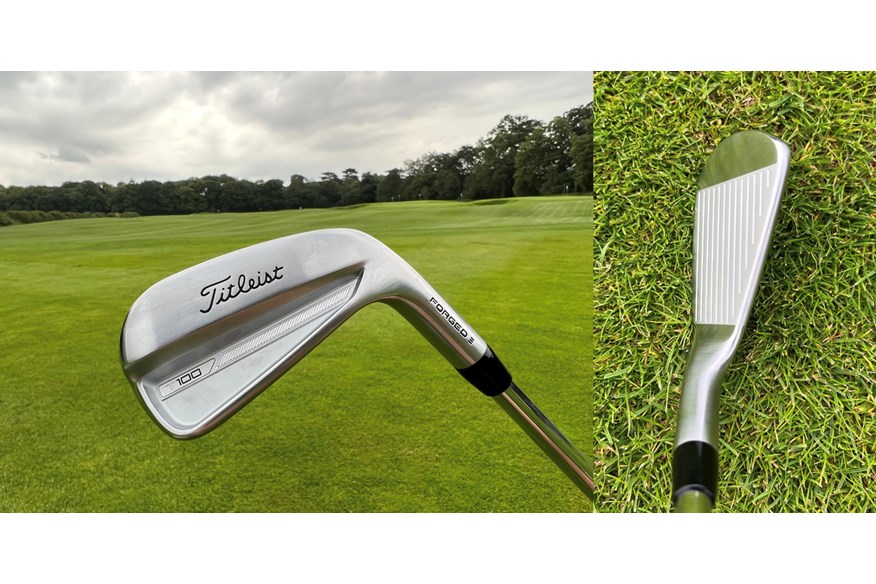
For the first time, Titleist’s iron engineers have worked with the sole shaping and turf interaction experts who produce Vokey wedges. They’ve created a smoother sole shape that has a less pronounced trailing edge, which is faster through the turf. All in this is a very hi-tech club and one of the best players’ irons available. If its predecessor is anything to go by, this model will be both Titleist’s most-played iron, and the most-played iron on tour.
For an iron of this stature, the cavity detailing is CNC machined, which avoids using a cavity badge, an idea that’s been known to cheapen the cosmetic appeal of tons of great irons before.
Specs: Titleist T100 2023 iron
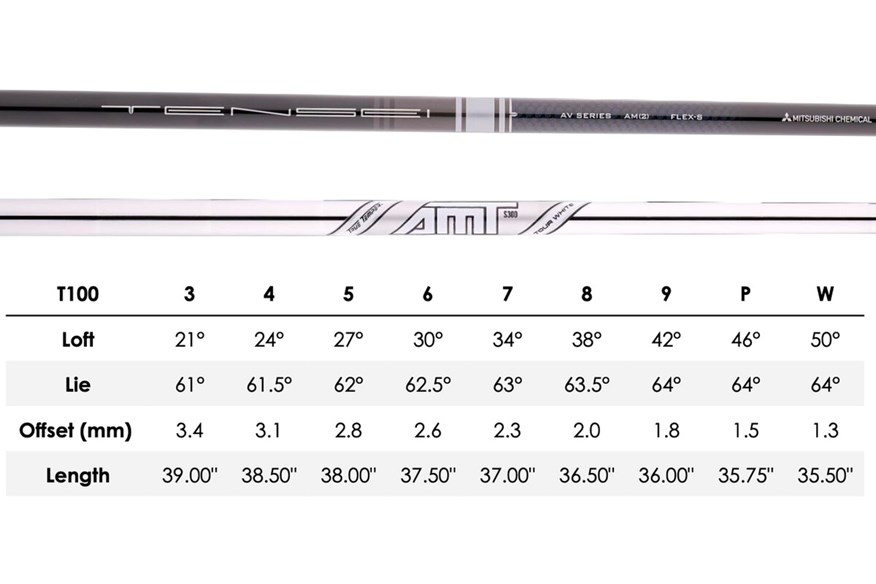
RRP: £178.50 (s) £192.50 (g) per club or £1249.50 (s) £1347.50 (g) for 7 irons.
Stock shaft: True Temper AMT Tour White (Low Launch, Low Spin – steel) or Mitsubishi Tensei White AM2 (Low Launch, Low Spin graphite)
Category: Players’ Iron
Forgiveness rating: 2/5
7-iron loft: 34°
Video: How does the Titleist T100 compare to other leading 2024 Players’ Irons?
Everything you need to know about the Titleist T150 2023 iron
Titleist’s faster tour iron. Where the T150’s predecessor, the T100 S, was just a 2° stronger version of the 2021 T100 iron, this new model is a very different beast compared to the 2023 T100. Golfers can expect more ball speed, more distance, and thanks to a slightly wider sole and locating more weight lower, more forgiveness too. Expect an improved iron for the model’s intended target audience, despite hosel offset and blade length being very much like the new T100.
Like the T100, the model is fully forged with dual cavity toe and heel weighting. There’s also a CNC Milled face for precision and a Muscle Channel along the back bar that aids face flex to maximize ball speed.
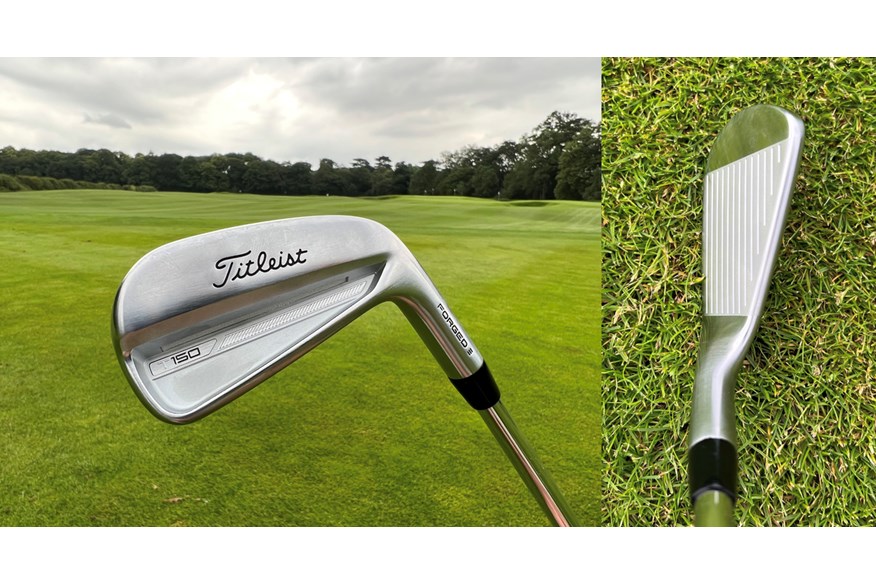
Expect this model to appeal to golfers wanting the precision of the T100 but with added ball speed, carry distance, and some additional forgiveness. If you’ve loved Titleist’s AP2 irons before but found the previous T100 a little bit small, this model should be right up your street.
If you’re torn between this model and the T200, the choice will likely come down to whether you want the feel, and feedback of a full-on forged iron (the T150), or your game being better served by the benefits of a slightly bigger, more forgiving hollow body head like the T200.
Specs: Titleist T150 2023 iron
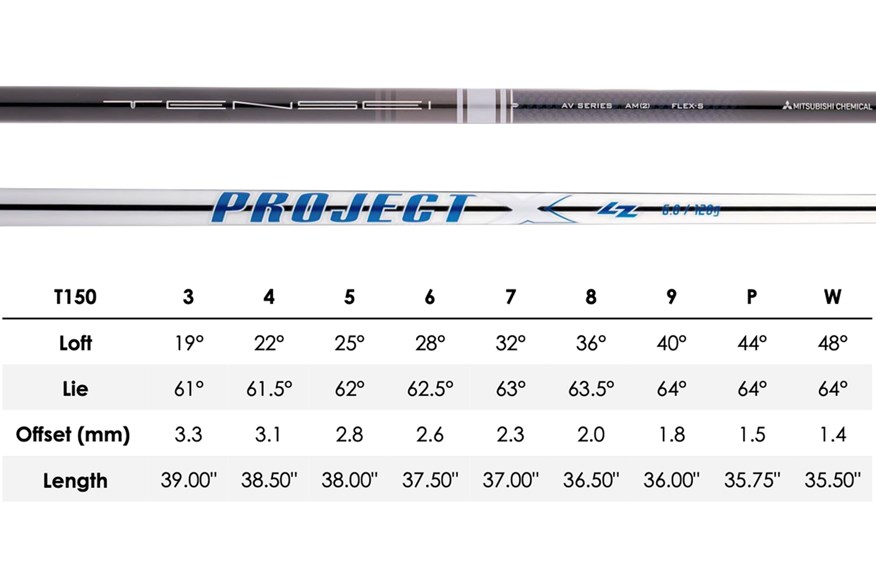
RRP: £178.50 (s) £192.50 (g) per club or £1249.50 (s) £1347.50 (g) for 7 irons
Stock shaft: True Temper Project X LZ (Low Launch, Low Spin steel) or Mitsubishi Tensei White AM2 (Low Launch, Low Spin graphite)
Category: Players Distance Iron
Forgiveness rating: 2.5/5
7-iron loft: 32°
Verdict: Titleist T150 2023 iron
It’s only when you carry out proper side-by-side testing like we do here at TG that you get to see the performance data differences between various models within a single brand line-up. And there are not two models out there that better highlight the differences than the Titleist T100 and T150. Both models are aimed at players’, and the T100 is extremely popular on tour, yet its 7-iron loft is 2° weaker than the T150. Despite seeing such success in the bags of some of the best players in the world my experience says the majority of club golfers though will struggle to see past the T150.
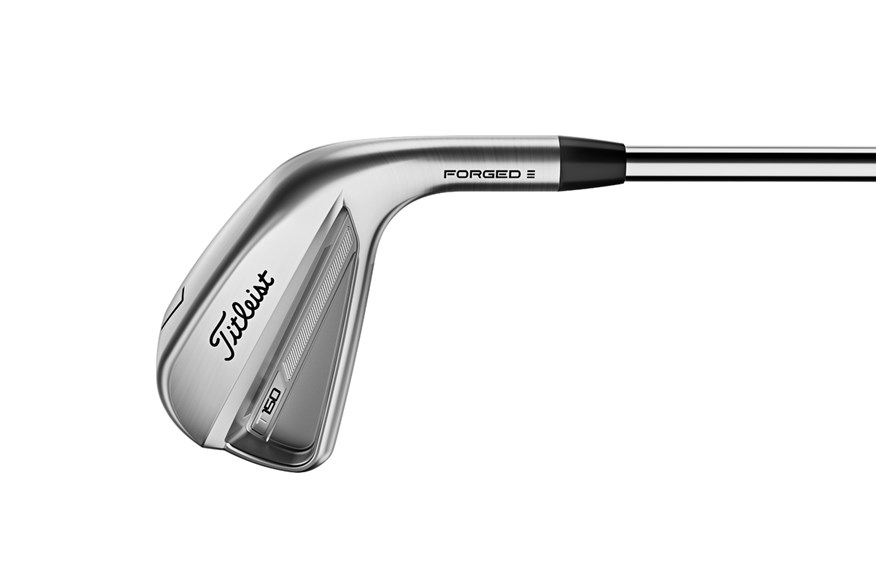
For our test pro, the T150 produced 4.5mph more ball speed than the T100. It launched and flighted shots higher than our test average and despite the stronger loft shots hit the green at a steeper angle too. Performance which Titleist will say comes from the head now having its own identity (with a wider sole etc) rather than just being a 2° stronger version of the T100. Throw in 8 yards more carry distance with a 7-iron and very few club golfers in their right mind will feel the T100 is their better option.
That sort of performance puts the T150 among my top 10 performing players’ irons of 2024. If you find yourself drawn to a set you’ll be delighted to hear at just 4 yards the model also clocked up our second smallest carry distance drop-off and third smallest shot area of the entire 25 model test. Impressive stuff.
Data comparison: How does the Titleist T150 compare to leading competitor players’ irons?
| Iron | 7-Iron Loft | Ball Speed | Launch Angle | Backspin | Height | Descent Angle | Carry Distance | Carry Distance Drop Off | Shot Area |
| PXG 0317 T | 32° | 125 MPH (1) | 15.6° | 5343 RPM | 32 YDS | 45.1° | 182 YDS (1) | 6 YDS | 118.2 SQ YDS |
| PXG 0317 CB | 33° | 122.8 MPH | 16.6° | 5568 RPM | 32 YDS | 45.7° | 179 YDS (T2) | 7 YDS | 142.1 SQ YDS |
| Vega VDC | 31° | 124.4 MPH (2) | 14.8° | 5703 RPM | 30 YDS | 44.4° | 179 YDS (T2) | 8 YDS | 236.8 SQ YDS |
| Srixon ZX7 MK II | 32° | 122.9 MPH (3) | 16.7° | 5757 RPM | 32 YDS | 46.1° | 178 YDS | 7 YDS | 57.4 SQ YDS |
| Sub 70 659 CB | 32° | 122.8 MPH | 15.3° | 5683 RPM | 30 YDS | 44.2° | 178 YDS | 8 YDS | 70.4 SQ YDS |
| More MOD 1 | 32° | 121.5 MPH | 15.9° | 5370 RPM | 30 YDS | 44.1° | 178 YDS | 2 YDS (1) | 48.4 SQ YDS (2) |
| Ping Blueprint S | 33° | 121.3 MPH | 16.7° | 5498 RPM | 31 YDS | 45.1° | 177 YDS | 9 YDS | 188.1 SQ YDS |
| Titleist T150 | 32° | 122.6 MPH | 17.5° | 5686 RPM | 34 YDS | 46.8° | 177 YDS | 4 YDS (2) | 53.6 SQ YDS (3) |
| Takomo 201 | 32° | 122.6 MPH | 15.7° | 6070 RPM | 31 YDS | 45° | 176 YDS | 9 YDS | 119.7 SQ YDS |
| Cobra King Tour | 32° | 120.9 MPH | 15.4° | 5534 RPM | 29 YDS | 43.1° | 176 YDS | 9 YDS | 253.8 SQ YDS |
| TaylorMade P770 | 33° | 122.3 MPH | 17.8° | 6143 RPM | 34 YDS | 47.5° | 175 YDS | 9 YDS | 200.7 SQ YDS |
| Mizuno JPX923 Tour | 34° | 121 MPH | 16.2° | 5704 RPM | 30 YDS | 44.6° | 175 YDS | 9 YDS | 171 SQ YDS |
| Vega VSC | 31° | 121.7 MPH | 15.2° | 5943 RPM | 29 YDS | 43.8° | 175 YDS | 14 YDS | 387.8 SQ YDS |
| Callaway Apex 24 Pro | 33° | 122.4 MPH | 16.2° | 6026 RPM | 27 YDS | 43.3° | 174 YDS | 7 YDS | 128.1 SQ YDS |
| Callaway Apex TCB | 34° | 121.9 MPH | 16.6° | 5189 RPM | 32 YDS | 46.1° | 174 YDS | 5 YDS (3) | 46 SQ YDS (1) |
| Mizuno Pro 243 | 32° | 122.2 MPH | 16.6° | 6035 RPM | 32 YDS | 46.3° | 174 YDS | 18 YDS | 387 SQ YDS |
| Ping i230 | 33° | 121.3 MPH | 16.4° | 5821 RPM | 31 YDS | 45.7° | 173 YDS | 19 YDS | 248.9 SQ YDS |
| Sub 70 639 CB | 32° | 122.3 MPH | 15.4° | 6584 RPM | 30 YDS | 45.4° | 173 YDS | 13 YDS | 266.5 SQ YDS |
| Callaway Apex 24 CB | 34° | 120.6 MPH | 16.7° | 6235 RPM | 31 YDS | 46.2° | 170 YDS | 9 YDS | 151.2 SQ YDS |
| Takomo 301 CB | 34° | 120 MPH | 17.3° | 6410 RPM | 32 YDS | 46.4° | 170 YDS | 7 YDS | 152.6 SQ YDS |
| TaylorMade P7MC | 34° | 119.5 MPH | 18° | 6226 RPM | 33 YDS | 47.2° | 169 YDS | 11 YDS | 135.3 SQ YDS |
| Wilson Staff Model CB | 34° | 118.6 MPH | 16.3° | 6221 RPM | 29 YDS | 44.8° | 169 YDS | 6 YDS | 76.8 SQ YDS |
| Titleist T100 | 34° | 118.1 MPH | 17.3° | 5677 RPM | 31 YDS | 45.4° | 169 YDS | 8 YDS | 107.2 SQ YDS |
| Ben Hogan PTX Tour | 33.5° | 117.9 MPH | 16° | 5767 RPM | 28 YDS | 43.5° | 169 YDS | 11 YDS | 335.5 SQ YDS |
| Titleist 620 CB | 34° | 117.9 MPH | 17.9° | 6127 RPM | 32 YDS | 46.5° | 167 YDS | 13 YDS | 274.3 SQ YDS |
| Average | 121.4 MPH | 16.4° | 5853 RPM | 30.9 YDS | 45.3° | 174.2 YDS | 9.1 YDS | 174.3 SQ YDS |
Everything you need to know about the Titleist T200 2023 iron
Titleist’s modern-day hollow body players’ distance iron, the T200 combines a tidy head shape and profile and it’s aimed at golfers who want distance help in their game yet don’t want to sacrifice looks, feel, trajectory, or stopping power. Inside, the model’s been completely reengineered to deliver a stiffer more stable chassis, which feels dramatically better than its predecessor, which makes the T200 one of the best players’ distance irons available.
Part of the improved feel that Titleist talk about comes from a more centered Max Impact support bar behind the face (with polymer sat between the pair), and a newly stiffened back badge. The badge has also been specifically designed to eliminate the issues some golfers experienced with badges popping out of the previous T200 model.
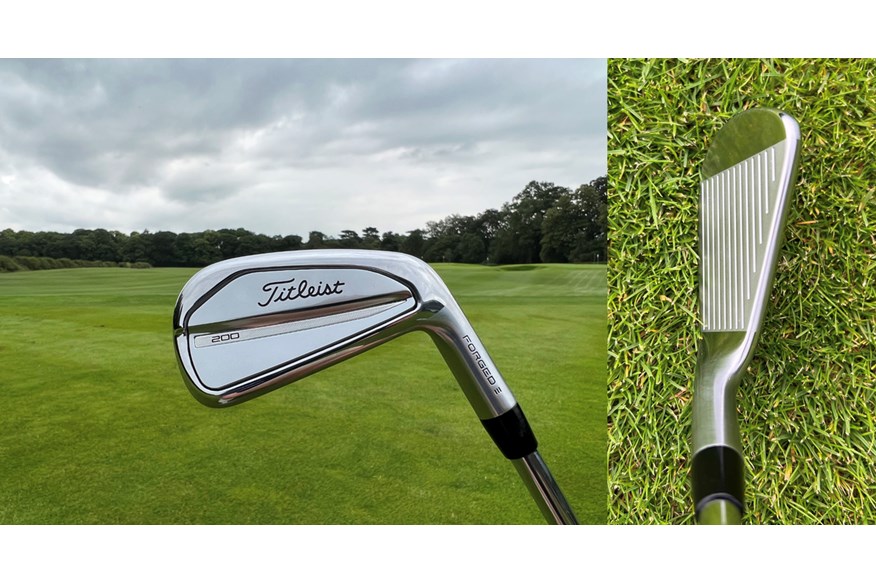
If hosel offset is important to you, the T200 has very similar levels to the T100. So don’t expect a hugely confidence-inspiring look at address. The T200 is often played as long irons on tour. Its top edge thickness mimics the super popular TaylorMade P790, but the two have a slightly different appearance at address thanks to additional bevelling and misting.
Unlike the T100 and T150, the T200 isn’t fully forged. The face is forged but the back and hosel are cast, as in most hollow body irons.
The T200 has an L-shape profile, plus there’s a variable thickness pattern on the back to help neutralize the effects of off-center hits.
Specs: Titleist T200 2023 iron
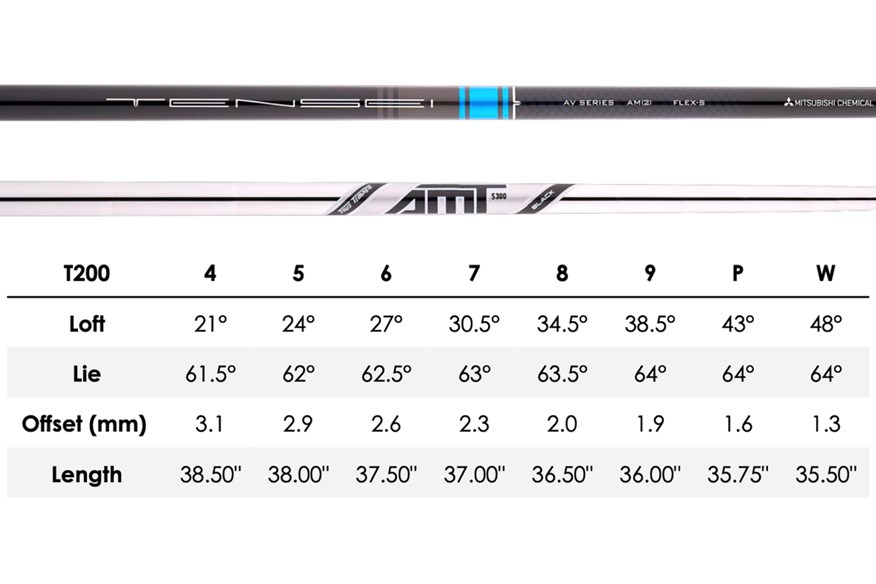
RRP: £178.50 (s) £192.50 (g) per club or £1249.50 (s) £1347.50 (g) for 7 irons
Stock shaft: True Temper AMT Black (Mid Launch, Mid Spin steel) or Mitsubishi Tensei Blue AM2 (Mid Launch, Mid Spin graphite)
Category: Players Distance Iron
Forgiveness rating: 2.5/5
7-iron loft: 30.5°
Video: How does the Titleist T200 compare to other leading 2024 Players’ Distance irons?
Verdict: Titleist T200 2023 iron
We specifically create an indoor lab when club testing over winter as it gives us a pleasant controlled environment to hit shots within all day, the confined space also accentuates the sound clubs make at impact. Despite the franchise being on the market since 2017 Titleist’s T200 iron still has, compared to the competition, a relatively loud clicky impact sensation, a feature that doesn’t go hand in hand with the desires of many decent players.
Our test pro has fitted lots of golfers into new irons since the most recent T200’s launched in August 2023 and he’s seen players routinely opt for the forged body T150’s over the forged face and cast unfilled body of the T200’s for this very reason.
If sound doesn’t bother you this phenomenon is absolutely nothing to worry about. The T200’s are beautifully proportioned and thanks to their very reasonable lofts I see them as a model that’s playable for reasonably consistent and confident ball strikers, even at slightly more average-speeds. When I was fitted for the T-Series in 2023 thanks to the slightly extra loft giving a better ball flight and spin numbers I had the option to play the model, even though I eventually chose the T350 for the reassurance of the bigger heads upping forgiveness.
If you’re drawn to the T200 I’d thoroughly recommend getting fitted through Titleist, from my experience the company has tons of fitting appointments around the country and their fitters come armed with tons of options and product knowledge. My advice though would be to hit a TaylorMade P790 beforehand just to see if you can hear/feel the difference between the filled and unfilled hollow bodies.
Data comparison: How does the Titleist T200 compare to leading competitor players’ distance irons?
| Iron | 7-Iron Loft | Ball Speed | Launch Angle | Backspin | Height | Descent Angle | Carry Distance | Carry Distance Drop Off | Shot Area |
| Mizuno JPX923 Hot Metal Pro | 28.5° | 124.1 MPH (1) | 14.6° | 4881 RPM | 28 YDS | 41.8° | 186 YDS (1) | 22 YDS | 741.4 SQ YDS |
| Srixon ZX5 MK II | 31° | 122.8 MPH (3) | 15.8° | 5292 RPM | 30 YDS | 44° | 181 YDS (T2) | 18 YDS | 392.4 SQ YDS |
| Callaway Paradym | 29° | 123 MPH (2) | 14.2° | 5120 RPM | 27 YDS | 41.5° | 181 YDS (T2) | 15 YDS | 360 SQ YDS |
| Mizuno JPX923 Forged | 30° | 122.4 MPH | 14.5° | 5117 RPM | 27 YDS | 41.8° | 180 YDS | 7 YDS (1) | 210 SQ YDS |
| PXG 0311 P GEN 6 | 30° | 122.2 MPH | 14.6° | 5520 RPM | 28 YDS | 42.6° | 178 YDS | 10 YDS | 199 SQ YDS |
| Vega Mizar Tour | 30° | 122.3 MPH | 13.5° | 5381 RPM | 26 YDS | 40.8° | 178 YDS | 13 YDS | 360.1 SQ YDS |
| Sub 70 699 Pro | 30° | 121.8 MPH | 14.9° | 5349 RPM | 28 YDS | 42.6° | 178 YDS | 10 YDS | 166 SQ YDS (1) |
| Yonex Ezone CB702 | 31° | 122.6 MPH | 15.6° | 5820 RPM | 30 YDS | 44.4° | 177 YDS | 23 YDS | 533.6 SQ YDS |
| TaylorMade P790 | 30.5° | 121.6 MPH | 15.1° | 5932 RPM | 29 YDS | 43.7° | 175 YDS | 8 YDS (T2) | 180.8 SQ YDS (2) |
| Wilson Dynapower Forged | 30.5° | 120.8 MPH | 13.9° | 5482 RPM | 26 YDS | 41.1° | 175 YDS | 9 YDS | 188.1 SQ YDS (3) |
| Ping i525 | 30.5° | 120 MPH | 15° | 5666 RPM | 28 YDS | 42.7° | 173 YDS | 11 YDS | 217.8 SQ YDS |
| Titleist T200 | 30.5° | 119.7 MPH | 15.4° | 5760 RPM | 28 YDS | 43.3° | 173 YDS | 13 YDS | 331.5 SQ YDS |
| Cobra Forged Tec | 29.5° | 119.4 MPH | 14.7° | 5558 RPM | 27 YDS | 41.9° | 173 YDS | 20 YDS | 612 SQ YDS |
| Mizuno Pro 245 | 30° | 119.3 MPH | 16.1° | 5481 RPM | 29 YDS | 43.6° | 173 YDS | 14 YDS | 271.6 SQ YDS |
| Takomo 101 T | 32° | 116.7 MPH | 16° | 6383 RPM | 28 YDS | 43.9° | 165 YDS | 8 YDS (T2) | 203.2 SQ YDS |
| Average | 121.2 MPH | 14.9° | 5516.1 RPM | 27.9 YDS | 42.6° | 176.4 YDS | 13.4 YDS | 331.2 SQ YDS |
Everything you need to know about the Titleist T350 2023 iron
Titleist are nowhere near as well known for making game-improvement irons as they are for producing brilliant muscleback blades and players’ irons. But, thanks to a true hollow body players’ distance iron construction, the brand reckon a third of their iron sales will come from this new T350 model. Despite having stronger lofts, which are in line with the mid-handicap iron category, golfers can expect the T350 to produce a high, long, and forgiving ball flight.
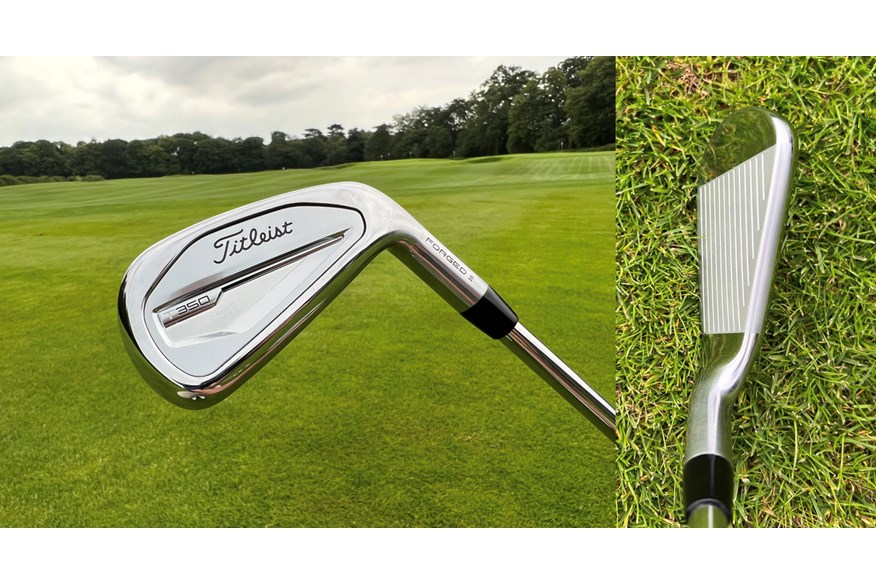
Like the T200, the T350 has a forged L-shaped face profile, and a newly repositioned (it’s higher to cope with the slightly bigger head size) Max Impact bar behind the face. For the first time in a Titleist game improvement iron, there’s also heel-side tungsten weighting, rather than just having mass stacked in the toe to up MOI.
Titleist see the T350 as the best game improvement iron available. In our book, if you see the model as a hollow body alternative to Ping’s G430 or the TaylorMade Stealth, you’ll be thinking exactly along the right lines.
Specs: Titleist T350 2023 iron
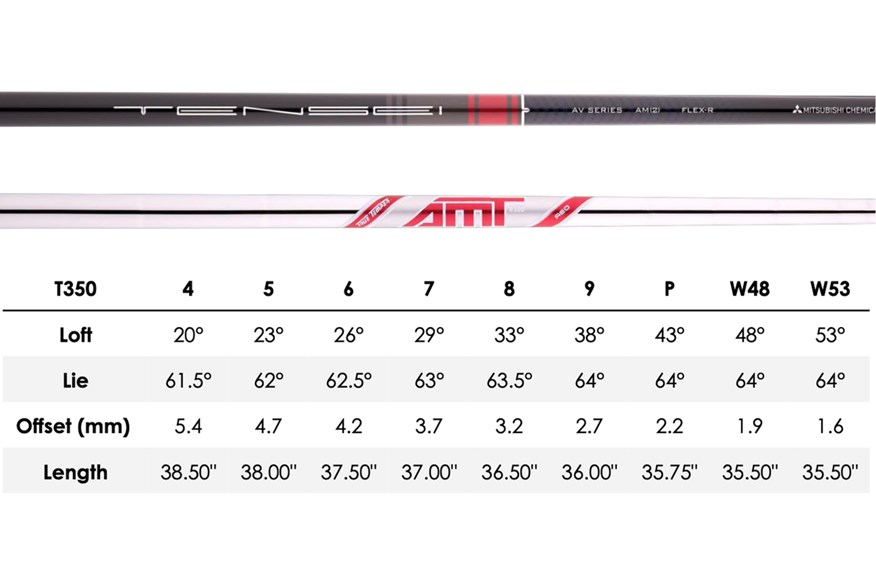
RRP: £178.50 (s) £192.50 (g) per club or £1249.50 (s) £1347.50 (g) for 7 irons
Stock shaft: True Temper AMT Red (High Launch, High Spin steel) or Mitsubishi Tensei Red AM2 (High Launch, High Spin graphite)
Category: Mid – High Handicapper Game Improver Iron
Forgiveness rating: 3.5/5
7-iron loft: 29°
Video: How does the Titleist T350 compare to leading competitor Mid-Handicap Irons?
Verdict: Titleist T350 2023 iron
Historically Titleist irons have struggled to feature among our very top performing irons of the year, which predominantly comes down to how the brands summer launch schedule has meant their offerings feel a bit old hat, and hard to heartily recommend by the time we test them six or eight months later. This year even though the T350 isn’t the fastest, longest, or most accurate Mid-Handicap Iron I’ve hit I believe the data and its overall performance spells out that the model is a top performer.
As golfers most of us want to play clubs we like the look of, especially when we’re often forking out over $1K/£1K for a decent set of irons. And if it’s looks you’re after there are not many better looking or more attractive mid-handicap iron options on the market in 2024 than the T350. I really like the straight top edge, how there’s isn’t a ton of hosel offset, and even though the heads bigger than the Titleist T200 it’s still really attractive and easy on the eye when sat behind the ball.
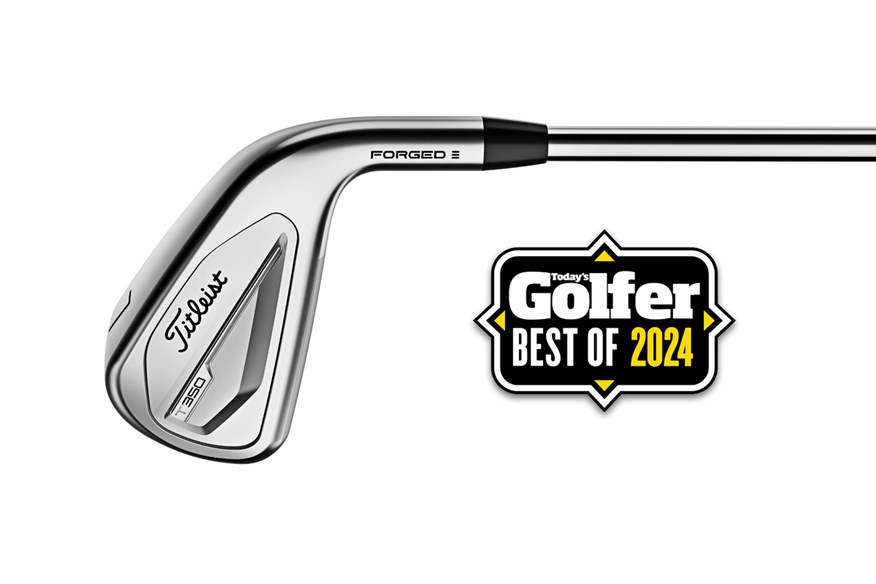
Our test data shows the T350 almost to a tee follows our 2024 test averages, which to many might not scream top performer. But throw in a forged face, a ton of tungsten toe weighting to up MOI, and an array of top fitting options (which many in the category can’t compete with), and this model should at least be on the mid-handicappers shortlist to try.
Personally, I’ve played the model since August 2023 and I really like the impact sound and feel along with how the slightly weaker lofts (than some of the competition) help flight shots for maximum playability and not just most speed or distance. To take full advantage of what Titleist have to offer ensure you get properly fitted as the brand prides itself on being custom fit leaders.
Data comparison: How does the Titleist T350 compare to leading competitor Mid-Handicap Irons?
| Iron | 7-Iron Loft | Ball Speed | Launch Angle | Backspin | Height | Descent Angle | Carry Distance | Carry Distance Drop Off | Shot Area |
| TaylorMade Qi | 28° | 129.2 MPH (3) | 15.6° | 5065 RPM | 33 YDS | 44.2° | 198 YDS (T1) | 12 YDS | 267.6 SQ YDS |
| PXG 0211 XCOR2 | 28° | 130.1 MPH (2) | 13.6° | 5057 RPM | 29 YDS | 41.8° | 198 YDS (T1) | 16 YDS | 193.6 SQ YDS |
| Callaway Paradym Ai Smoke | 28° | 130.6 MPH (1) | 14.5° | 5311 RPM | 32 YDS | 43.4° | 197 YDS (3) | 18 YDS | 552.6 SQ YDS |
| Wilson Dynapower | 27° | 127.8 MPH | 15° | 4910 RPM | 31 YDS | 42.7° | 195 YDS | 8 YDS (T3) | 196.8 SQ YDS |
| Cobra Forged Tec X | 27° | 127.7 MPH | 13.9° | 4872 RPM | 29 YDS | 42.1° | 191 YDS | 9 YDS | 360 SQ YDS |
| PXG 0311 XP GEN6 | 27° | 126.2 MPH | 13.7° | 4726 RPM | 27 YDS | 40.8° | 190 YDS | 20 YDS | 470 SQ YDS |
| Mizuno JPX923 Hot Metal | 28.5° | 127.6 MPH | 14.9° | 5748 RPM | 31 YDS | 44.2° | 190 YDS | 13 YDS | 243.1 SQ YDS |
| Srixon ZX4 | 28.5° | 126.4 MPH | 14.7° | 5030 RPM | 30 YDS | 43.1° | 189 YDS | 22 YDS | 594 SQ YDS |
| Ram FXT | 126.1 MPH | 15.4° | 5395 RPM | 31 YDS | 43.7° | 189 YDS | 13 YDS | 161.2 SQ YDS | |
| Cleveland XL ZipCore | 29° | 125.1 MPH | 14.6° | 4719 RPM | 29 YDS | 41.8° | 188 YDS | 15 YDS | 210 SQ YDS |
| Ping G430 | 29° | 125.8 MPH | 14.9° | 5117 RPM | 30 YDS | 43.3° | 187 YDS | 7 YDS (2) | 110.6 SQ YDS (2) |
| Inesis 500 | 125.1 MPH | 15.6° | 5456 RPM | 31 YDS | 43.5° | 187 YDS | 8 YDS (T3) | 181.6 SQ YDS | |
| Titleist T350 | 29° | 125.5 MPH | 14.3° | 5159 RPM | 29 YDS | 42.6° | 186 YDS | 11 YDS | 167.2 SQ YDS |
| Cobra Darkspeed | 27° | 126.7 MPH | 12.4° | 5298 RPM | 26 YDS | 40.7° | 186 YDS | 8 YDS (T3) | 129.6 SQ YDS |
| Takomo 101 | 30° | 123.8 MPH | 14° | 4784 RPM | 27 YDS | 40.8° | 184 YDS | 4 YDS (1) | 52.4 SQ YDS (1) |
| Yonex GS i-Tech | 125.2 MPH | 13.8° | 5373 RPM | 28 YDS | 42.2° | 184 YDS | 21 YDS | 611.1 SQ YDS | |
| Vega Mizar Plus | 30° | 125.4 MPH | 14.3° | 5858 RPM | 29 YDS | 43.8° | 182 YDS | 22 YDS | 420.2 SQ YDS |
| Sub 70 699 | 31° | 124.1 MPH | 13.3° | 5847 RPM | 27 YDS | 42.1° | 179 YDS | 11 YDS | 154 SQ YDS |
| MacGregor V-Max | 118.3 MPH | 17.5° | 6305 RPM | 31 YDS | 45.3° | 171 YDS | 8 YDS (T8) | 121.6 SQ YDS (3) | |
| AVERAGE | 126.1 MPH | 14.5° | 5265 RPM | 29.5 YDS | 42.7° | 187.9 YDS | 12.9 YDS | 273.5 SQ YDS |
Titleist on the 2023 T-Series irons
“The new T-Series irons embody a unique approach to iron design and creation,” said Josh Talge, VP, Titleist Golf Club Marketing. “Down to the finest details, this new line delivers best-in-class performance with stunning aesthetics and feel. Each model has been designed to feel as good as it looks, look as good as it performs, and perform better than any iron we’ve created before it.”
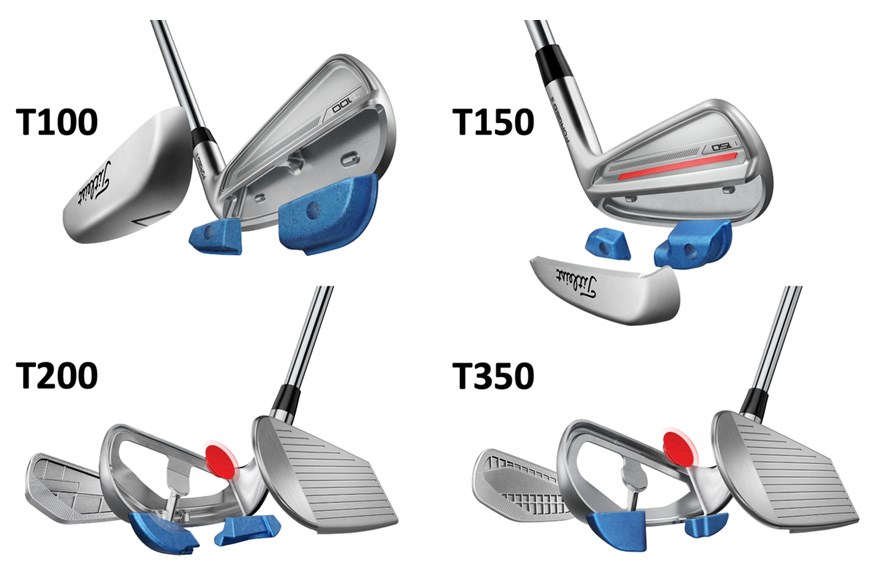
“New T-Series irons raise the bar in terms of total performance. Players are always looking for iron performance to be more consistent,” said Marni Ines, Director, Titleist Irons Development, Golf Club R&D. “We want players to hit their distance as often as possible, we want players to hit their preferred flight as often as possible, and we want as tight a dispersion pattern as possible. Each new T-Series iron – from T100 all the way to T350 – feels outstanding, and all of them perform better across the board.”
How the Titleist T-Series irons compare in data
| Club | Loft | Ball Speed | Launch Angle | Backspin | Height | Descent Angle | Carry Distance |
| Titleist T100 | 34° | 121.9 MPH | 15.4° | 6650 RPM | 30 YDS | 44.7° | 173 YDS |
| Titleist T150 | 32° | 125.3 MPH | 14.9° | 5683 RPM | 30 YDS | 44° | 182 YDS |
| Titleist T200 | 30.5° | 124.7 MPH | 14.5° | 5974 RPM | 29 YDS | 43.6° | 181 YDS |
| Titleist T350 | 29° | 129.4 MPH | 14.1° | 5420 RPM | 31 YDS | 43.7° | 192 YDS |
Which Titleist T-Series 2023 iron suits you?
Titleist T100
Stock shaft: True Temper AMT Tour White (Low Launch, Low Spin – steel)or Mitsubishi Tensei White AM2 (Low Launch, Low Spin graphite)
Category/Forgiveness rating: Players’ Iron 2/5
Construction: Forged cavity with internal weighting
Handicap range: Six and below
7-iron loft: 34°
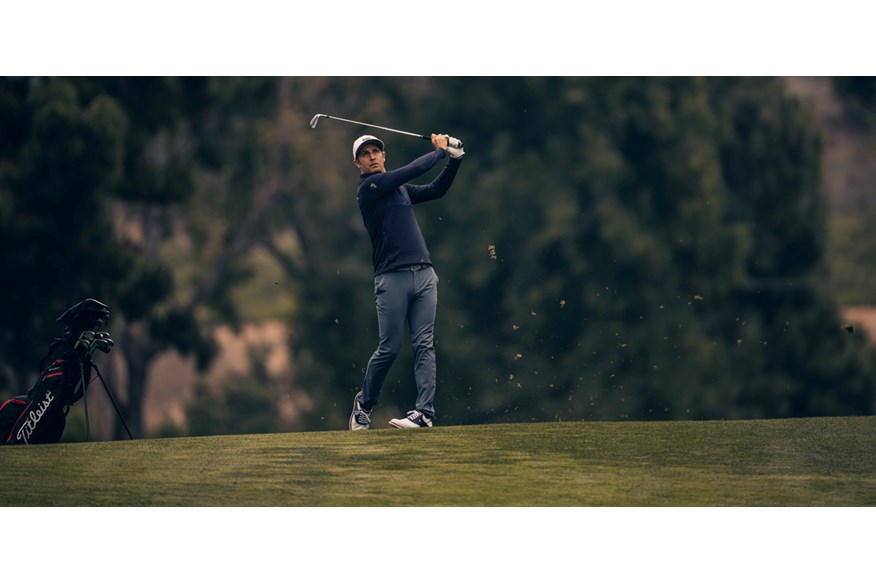
Who are they for?
If history is anything to go by this will be Titleist’s most played tour iron and likely the most played iron on tour, which has to say the T100 is very much the modern tour iron. The face and hosel are one-piece forged before tungsten toe and heel weights get brazed inside and a back cap welded on. The head profile is sleek and compact which caters to decent players who feel they can’t compromise on headsize in exchange for additional performance traits.
Our test data shows brilliantly the effect this model having the weakest 7-iron loft has on spin, descent angle and distance. Expect the T100 to be the shortest carrying iron within the T-Series family. Golfers choosing this model will not have adding additional ball speed or distance anywhere near the top of their list of priorities when choosing a new set of irons. If you do you’re looking in the wrong category.
If you go for a Titleist iron fitting, you should be encouraged to hit this model. Then you’ll see the effect this higher lofted model has on launch, flight, backspin and how shots hit the green at a steeper descent angle, all of which at average speeds will cost valuable yards. In reality this model is likely to suit less than 10% of club golfers, even though a much larger number will aspire to play them.
Titleist T150
Stock shaft: True Temper Project X LZ (Low Launch, Low Spin steel) or Mitsubishi Tensei White AM2 (Low Launch, Low Spin graphite)
Category/Forgiveness rating: Players Distance Iron 2.5/5
Construction: Forged cavity with internal weighting
Handicap range: Eight and below
7-iron loft: 32°
Who are they for?
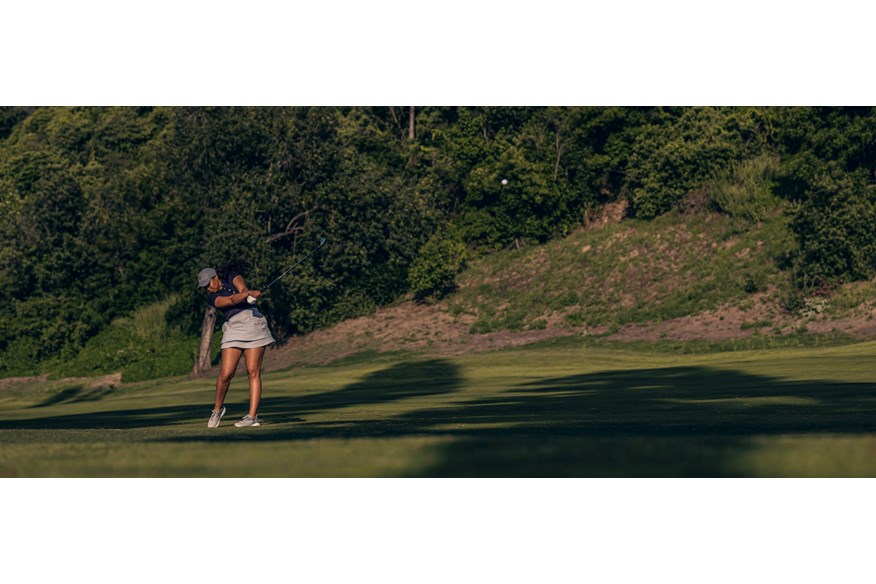
Titleist’s faster tour iron. Where the T150’s predecessor, the T100 S were simply a 2° stronger version of the 2021 T100 iron, this new model is very different compared to the 2023 T100. Golfers can expect more ball speed and distance, but also thanks to a slightly wider sole and locating more weight lower, more forgiveness too. You get all that with a very similar hosel offset and blade length to the T100.
Just like the T100 the model is fully forged with dual cavity tungsten toe and heel weighting, and a CNC Milled face for precision. A Muscle Channel along the back bar aids face flex and maximises ball speed.
Our test data has the model producing 3.4 mph more ball speed and 9 yards more carry distance with a 7-iron than the T100. But, remember there’s a trade-off in backspin and descent angle to factor into the equation.
If you find yourself torn between this model and the T200 decisions should come down to whether or not you want the feel, and feedback of a full-on forged iron (the T150). Or, your game being better served by the benefits of a slightly bigger more forgiving hollow body head like the T200.
Titleist T200
Stock shaft: True Temper AMT Black (Mid Launch, Mid Spin steel) or Mitsubishi Tensei Blue AM2 (Mid Launch, Mid Spin graphite)
Category/Forgiveness rating: Players Distance Iron 2.5/5
Construction: Forged face withhollow body and internal tungsten weighting
Handicap range: 12 and below
7-iron loft: 30.5°

Who are they for?
The Titleist T-Series modern day hollow body players’ distance iron. The T200 combines a very tidy head shape and profile. It’s aimed at golfers who want distance help in their game but don’t want to sacrifice looks/feel, trajectory or stopping power to get it. Inside the model’s reengineered to deliver a stiffer more stable chassis. A Max Impact support bar behind the face tunes sound and feel to dramatically better levels than its predecessor.
On paper this is Titleist’s competitor to the TaylorMade P790, Ping i525 and Callaway Paradym irons. Yet if you’re sensitive to larger amounts of hosel offset the T200 has very similar levels to the smaller tour focused T100. We like how the model comes with a mid-launch/mid-spin shaft to help counteract the effect of the stronger lofts. They helped our test pro maintain reasonable levels of spin, height and descent angle switching to this model from the T150.
80% of tour pro’s now play blended sets, where a single model isn’t used throughout the whole set. The T200 is the long iron weapon of choice for a good number of Titleist pros. Like many hollow body distance irons the face is forged (with variable thickness to help counteract the effects of off centre hits), where the body isn’t, Titleist also don’t fill the head like PXG and TaylorMade.
Titleist T350
Stock shaft: True Temper AMT Red (High Launch, High Spin steel) or Mitsubishi Tensei Red AM2 (High Launch, High Spin graphite)
Category:/Forgiveness rating Mid – High Handicapper Game Improver Iron
Construction: Forged face withhollow body and internal tungsten weighting
Handicap range: 12 and above
7-iron loft: 29°
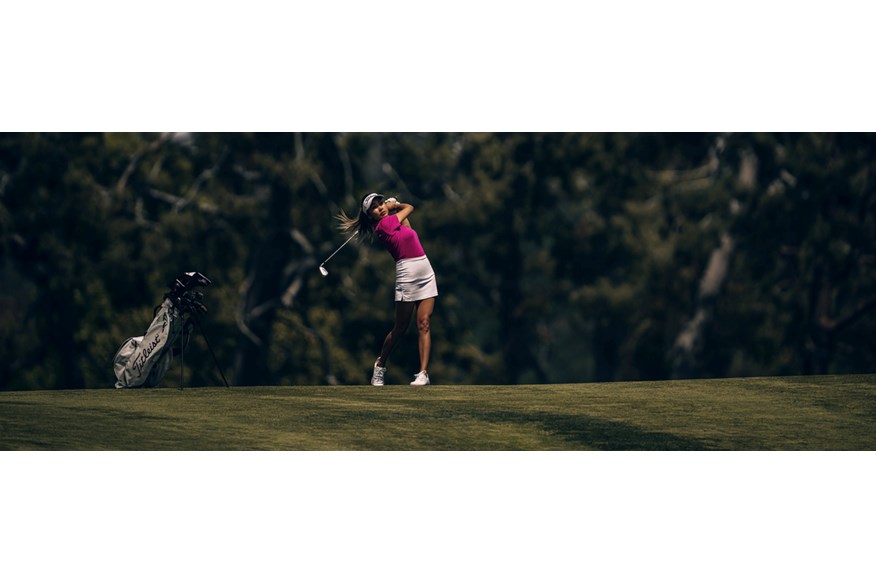
Who are they for?
Titleist are nowhere near as well known for making game improver irons as they are for producing brilliant muscleback blades and players irons, but thanks to cracking looks and a true hollow body players’ distance iron construction this model will make up a third of the brands iron sales. The T350 has been designed to produce a high, far, and forgiving ball flight, which is a brilliant combination considering the stronger lofts.
We’ve never quite seen Titleist game improver irons as direct rivals to Ping’s G430 or the TaylorMade Stealth but with the T350 being so attractive it now has to be factored into any mid-handicap iron buying decision. Inside, like the T200 a Max Impact bar sits behind the face stiffening the chassis, which ups speed and helps neutralize the effects of off-centre hits. For the first time in a Titleist game improver, there’s heel and toe tungsten weighting, whereas before the brand just stacked mass in the toe to up MOI.
High launch, high spin shafts make the model playable for more average-speed players, even though with the strongest lofts, the T350s are the most powerful iron within the family.
READ NEXT
– Which Titleist iron suits you?
Product Information
Titleist T100 (2023) irons
RRP: £178.50 (s) £192.50 (g) per club or £1249.50 (s) £1347.50 (g) for 7 irons.
Stock shaft: True Temper AMT Tour White (Low Launch, Low Spin - steel) or Mitsubishi Tensei White AM2 (Low Launch, Low Spin graphite)
Category: Players’ Iron
Forgiveness rating: 2/5
7-iron loft: 34°
Titleist T150 (2023) irons
RRP: £178.50 (s) £192.50 (g) per club or £1249.50 (s) £1347.50 (g) for 7 irons
Stock shaft: True Temper Project X LZ (Low Launch, Low Spin steel) or Mitsubishi Tensei White AM2 (Low Launch, Low Spin graphite)
Category: Players Distance Iron
Forgiveness rating: 2.5/5
7-iron loft: 32°
Titleist T200 (2023) Irons
RRP: £178.50 (s) £192.50 (g) per club or £1249.50 (s) £1347.50 (g) for 7 irons
Stock shaft: True Temper AMT Black (Mid Launch, Mid Spin steel) or Mitsubishi Tensei Blue AM2 (Mid Launch, Mid Spin graphite)
Category: Players Distance Iron
Forgiveness rating: 2.5/5
7-iron loft: 30.5°
Titleist T350 (2023) Irons
RRP: £178.50 (s) £192.50 (g) per club or £1249.50 (s) £1347.50 (g) for 7 irons
Stock shaft: True Temper AMT Red (High Launch, High Spin steel) or Mitsubishi Tensei Red AM2 (High Launch, High Spin graphite)
Category: Mid – High Handicapper Game Improver Iron
Forgiveness rating: 3.5/5
7-iron loft: 29°
Visit the Titleist website here
